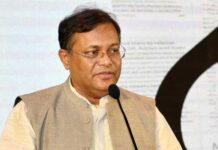
Defending his war crimes accused father Al Badr chief Motiur Rahman Nizami, Barrister Nazibur Rahman said Al Badr had emerged during the 1971 Liberation War.
He came up with the view while facing cross-examination by the prosecutor as the last witness (DW-4) before the International Crimes Tribunal-1 on Wednesday.
The 32-year-old Barrister admitted that Jamaat-e-Islami is a religion-based political party. “But it’s not true Jamaat was banned twice in Pakistan in 60s for carrying out terrorism and religious fanaticism. It was outlawed for its role in launching movement against the autocratic rule,” he said.
With his accused father in the dock, Barrister Nazibur further said that Jamaat-e-Islami, founded by Abul ‘Ala Maududi, got back its validity following orders by the Dhaka High Court and the Pakistan Supreme Court.
Asked whether the post-independence government prohibited Jamaat-e- Islami along with its student wing ICS as it had perpetrated crimes against humanity during the 1971 Liberation War in collaboration with the Pakistan occupation forces, the DW said: “It’s not true. Bangladesh Constitution prohibited functioning of religion-based political party.”
Replying to a prosecution suggestion, he denied that Gen Ziaur Raman, the founder of BNP, while in power, restored outlawed Jamaat-e-Islami as a political party. “In fact, Jamaat was revived in 1979 after the annulment of the constitutional restriction on religion based political party.”
During the cross-examination, DW Barrister Nazibur told the tribunal that during his personal investigation he had found the very existence of Al Badr, a vigilante group of Jamaat-e-Islami, during the Liberation War. “But I didn’t get any such information whether it was recognised as an auxiliary force of the Pakistan occupation army.”
He further said that after perusing the books on Bangladesh Liberation War during his personal investigation he had observed that his father Nizami was branded as the chief of Al Badr which he had founded during the Liberation War.
“Since 1986 my father Nizami, after attaining popularity in political arena, was made a victim of political reprisal, terming the books politically motivated as those were written sans any reference or correct information published after 1986 to fan out propaganda against my father,” he claimed.
Barrister Nazibur replied in the negative when asked whether during his personal investigation he met the local people at Pabna and its surroundings like freedom fighters, family members of the 1971 martyrs, victims of the War of Liberation and war-affected persons to pursue them to refrain from giving evidence at the tribunal to save his war crimes accused father.
The two designated prosecutors – Mohammad Ali and Abul Kalam – failed to finish the cross-examination within the tribunal-framed time.
As a result, the three-member tribunal, headed by Justice ATM Fazle Kabir, deferred to Thursday the scheduled prosecution case summing up argument.
During the cross-examination, the tribunal expressed its disappointment as the prosecutors failed to deliver properly for lack of their homework.
Before rising from the session, the tribunal asked the prosecutors to finish the cross-examination by an hour tomorrow (Thursday). Then the summing up argument will begin, it said.
A former minister during the past BNP-Jamaat rule, Nizami is being tried on charges of involvement in murders and torture of unarmed people along with hatching conspiracy, planning, incitement and complicity to commit genocide and crimes against humanity during the 1971 Liberation War in collaboration with the Pakistan occupation army.
Also the president of Islami Chhatra Sangha (ICS), the student wing of Jamaat-e-Islami in 1971, Nizami faces 16 counts of charges based on 16 separate incidents of crimes against humanity, in which at least 600 unarmed people were killed and 31 women raped during the Liberation War.
On May 28, 2012, the tribunal indicted the Jamaat ameer for committing the 1971 crimes against humanity.
On June 29, 2010, Nizami was arrested in front of the National Press Club after a magistrate court in Dhaka issued warrant of arrest in connection with a criminal case over hurting religious sentiment of Muslims. Later, he was shown arrested in connection with the war crimes case.
Source: UNB Connect









